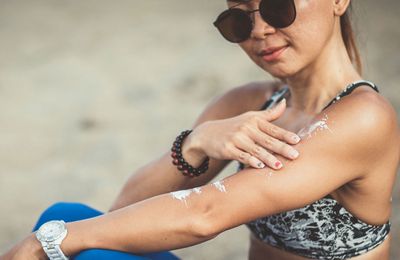Does purple toothpaste work?

Toothpaste aisles are packed full of weird and wonderful products with colourful cardboard sleeves - and even more colourful claims - trying to grab your attention.
But how well do fancy whitening toothpastes actually work?
We asked three leading experts to give us their verdict on whitening toothpaste claims, based on the ingredients listed and evidence provided by the manufacturers.
In some cases, effects are likely to be fleeting, and in others some ingredients have the potential to be too abrasive, or don't have good evidence behind them.
Find out which toothpaste trends to treat with caution below.
Tips for living well - get our free Food & Health newsletter: shop savvy, eat well, stay healthy
Optical brighteners - is 'instant whitening' worth it?

Whitening toothpastes typically work by removing surface stains caused by food and drink, and restoring teeth to their natural colour, but some products promise whiter teeth after one brush, including two our experts analysed.
Colgate Max White Purple Reveal (£5) and Pearl Drops Luminous Bright (£7) both use what’s called an optical enhancement effect, harnessing specific colour tones – typically purple or blue – to emphasise whiteness.
The idea is that the coloured film left on your teeth after brushing will cancel out any yellow tones, because these colours are opposite on the colour wheel and have a neutralising effect. This then gives the temporary appearance of a whiter smile.
Colgate emphasised the temporary nature of optical enhancement when we asked, but couldn’t tell us exactly how long it lasted. Both this and the Pearl Drops toothpaste also contain traditional whitening ingredients, such as mild abrasives which remove stains, but you'll find these in other basic whitening toothpastes too.
Our experts felt that optical enhancement was stretching the boundaries of what whitening traditionally means, but if a temporary fix appeals, just be aware that any improvements may be short-lived.
Choosing the best toothpaste - get the lowdown on the ingredients that are proven for sensitivity, whitening and more in our full guide
'Pro' whitening

Some whitening toothpastes avoid whizzy gimmicks and instead present as highly scientific, using medical-sounding terminology to impress.
Oral-B's 3D Clinical Whitening Restore Diamond Clean (£18), does just that.
It does have good lab-based evidence to back its claims, according to our experts, but they did note that lab-based test results aren't always replicated in the real world.
They were in broad agreement that this toothpaste would whiten your teeth by removing surface stains - and help prevent future staining - thanks to ingredients such as sodium hexametaphosphate and sodium fluoride.
Whether it’s worth the steep asking price, however, is another matter. It's usually on offer for around £9, though this is still more than most people are prepared to pay for toothpaste.
You’re paying extra for a paste that has good evidence to support it, but you could get similar effects using a cheaper product that contains similar ingredients.
5 tips for keeping your teeth healthy - oral care myths busted
Charcoal whitening

Charcoal toothpastes are now a common sight on supermarket shelves, with claims that the natural properties of charcoal will have a whitening effect on the teeth.
Our experts looked at Hello Epic's 'Whitening Activated Charcoal Toothpaste' (£6.99) and iWhite's Dark Stains Whitening toothpaste (£9.95).
They were generally sceptical of the benefits of charcoal-based products over other whitening toothpastes. In fact, there’s some evidence that charcoal could be too abrasive for teeth, doing more harm than good by damaging enamel.
Both the toothpastes we looked at contain other ingredients that could help to remove staining, such as silica in the Hello toothpaste, and phthalimidoperoxycaproic acid (PAP) in the iWhite toothpaste.
The inclusion of PAP proved noteworthy. PAP acts to brighten teeth, rather than just remove stains, but clinical research supporting PAP’s effectiveness looks at the ingredient’s use in a tooth-whitening tray, rather than in a toothpaste. Our experts questioned whether the levels permitted in toothpaste are high enough to have a whitening effect.
iWhite also claims to include ingredients that act as a film to prevent future staining, but our experts didn’t find evidence to support this in the research provided by the manufacturer.
How much will you have to pay at the dentist? Read our NHS and private dental charges guide
Whitening tablets

Toothpaste tablets are gaining popularity as a plastic-free alternative to toothpaste tubes. They typically come in glass jars and are designed to be chewed to form a paste in the mouth.
Our experts looked at two options: Lush's 'Sparkle' toothpaste tabs (£7) and Parla Naturally Whitening tabs (£7).
The Lush tabs that our experts analysed are fluoride-free, so they’re marketed purely as a whitening product. But this does raise questions over whether you would need them, as you can find fluoride toothpastes with stain-removal effects quite easily that will cover both bases.
The Parla tabs, on the other hand, do contain fluoride (considered by experts as essential for good dental health), as well as hydrated silica and other ingredients that help to remove surface stains. However, our experts did flag that studies have raised questions over whether fluoride, when applied via a tablet instead of in a paste, is as effective.
Can you recycle toothpaste tubes? Find out why they shouldn't go in your recycling bin, and what to do instead
Our toothpaste research
We asked manufacturers for the evidence behind their claims, and asked three leading dental experts to examine the evidence and assess the claims made by the toothpastes based on this evidence and the ingredients lists.
Our experts were:
- Dr Nigel Carter, chief executive of the Oral Health Foundation
- Derek Richards, director of the Centre for Evidence-based Dentistry (CEBD)
- Professor David Bartlett, head of Prosthodontics at King’s College
We’ve included the typical (non-offer) prices at the time of publication, but toothpastes are often sold on offer, sometimes by up to half the price if you shop around, so prices may vary.




